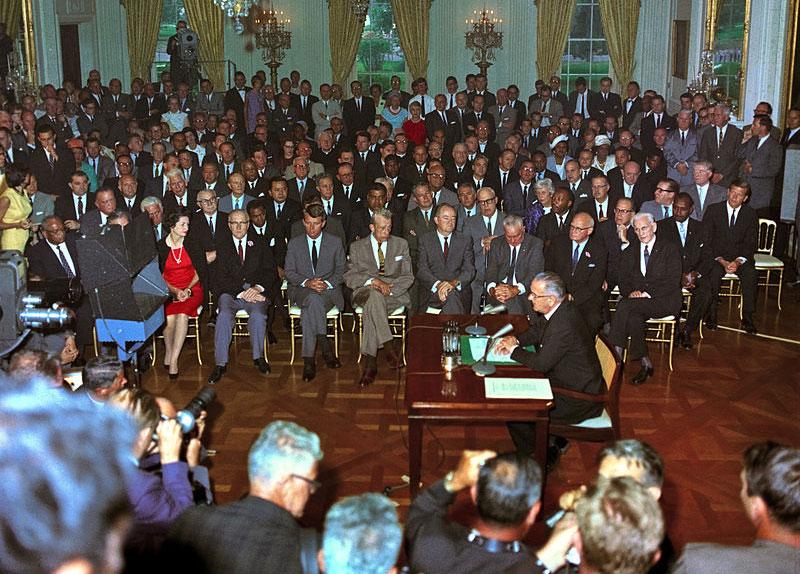Civil Rights Act Part of Complicated History, Mixed Legacy

July 2nd marked the 50th anniversary of President Lyndon B. Johnson signing the Civil Rights Act, which outlawed segregation in public places based on race, color, religion, sex or national origin, and made employment discrimination illegal.

Just a year earlier, the landmark legislation seemed improbable, according to “BackStory with the American History Guys,” the radio program produced by the Virginia Foundation for the Humanities with three commentators: University of Virginia history professor Brian Balogh, history professor emeritus Peter Onuf and former U.Va. historian Edward Ayers, now president of the University of Richmond.
The typical story goes that after President John F. Kennedy’s assassination, with the nation in mourning, Johnson and Congress committed to fulfilling his legacy. “The true story is a lot more complicated,” the History Guys say on this week’s episode, “Legislation Impossible: The Civil Rights Act of 1964.”
Despite the U.S. Supreme Court’s decision striking down school segregation, the justices didn’t spell out how to integrate public schools. The National Association for the Advancement of Colored People had brought thousands of lawsuits to the nation’s courts, but not much was changing, said U.Va. law professor Risa Goluboff, a guest on the show.
Previous attempts to enact a civil rights bill had failed in 1957 and 1960. Johnson, then Senate majority leader, was known as a great compromiser, said Kent Germany, editor of the Miller Center’s “Presidential Recordings: Lyndon B. Johnson” series. Liberal Democrats feared Johnson would water down the 1964 act, but he refused to budge. Up to Kennedy’s death, “the Kennedy administration had done the heavy lifting to get support through House and Senate committees,” said Germany, also an associate professor of history at the University of South Carolina. (For more on the Civil Rights Era, click here.)
International pressure played a role in Kennedy’s push to have a bill enacted, Ayers said on the radio show. As newly independent African nations sent their diplomats to Washington, they often flew to New York City and then drove to the capital. They complained about the discrimination they faced along the way.
“Route 40 in Maryland was becoming a public relations nightmare for the president,” Ayers said, and his administration told local businesses their racist stance was undermining international respect for the U.S. But the owners would not change.
As Kennedy and attorney general Robert F. Kennedy negotiated with Congress to create civil rights legislation that would pass, they brokered away an important component: the federal authority to bring lawsuits against states to protect citizens exercising their rights, Germany said. Only the education provision remained, giving the attorney general the power to sue for desegregation.
“Giving too much power to the attorney general was frightening to the Southerners – it would’ve been like Reconstruction all over again,” Germany said.
Although Johnson took a “bold stance” in making the Civil Rights Act become reality, Deborah McDowell, director of U.Va.’s Carter G. Woodson Institute for African-American and African Studies, said he could not ignore the unrelenting pressure coming from civil rights activists, known and unknown – “local people, as well as national icons like Rev. Martin Luther King Jr.” Kent and the History Guys echoed the importance of the movement’s activities.
While the bill moved through Congress, participants in the Freedom Summer project in the South were working to increase voter registration in the face of escalating violence. McDowell pointed out that the Civil Rights Act proved insufficient alone and led to the passage of the Voting Rights Act the following year.
The landmark legislation was just part of the turbulent times that led to an opening up – and in other ways, a closing down – of American society, Germany said.
“The dynamic on the sidewalk changed pretty quickly,” he said. Referring to the desegregation of public places, such as restaurants, stores and theaters, he said the generation of African-Americans were empowered – they didn’t have to move off the sidewalk to let white people pass, for instance.
White segregationists realized they wouldn’t be entitled to act on their prejudice in public, he said. In response, they established private spaces, from schools to pools to suburbs – what he called “the closing down of society.”
One side-effect of the Civil Rights Act – the inclusion of not discriminating on the basis of sex – opened the door for women, especially in fighting employment discrimination, said Germany – a point the “BackStory” show also discusses.
The History Guys mentioned that neither the Civil Rights Act nor the Voting Rights Act addressed the economic insecurity and alienation black people continued to confront.
“Commemorating anniversaries often becomes an excuse for avoiding the urgencies of the present,” McDowell said, “but it’s important to revisit this period for its relevance to our current times and social conditions.”




